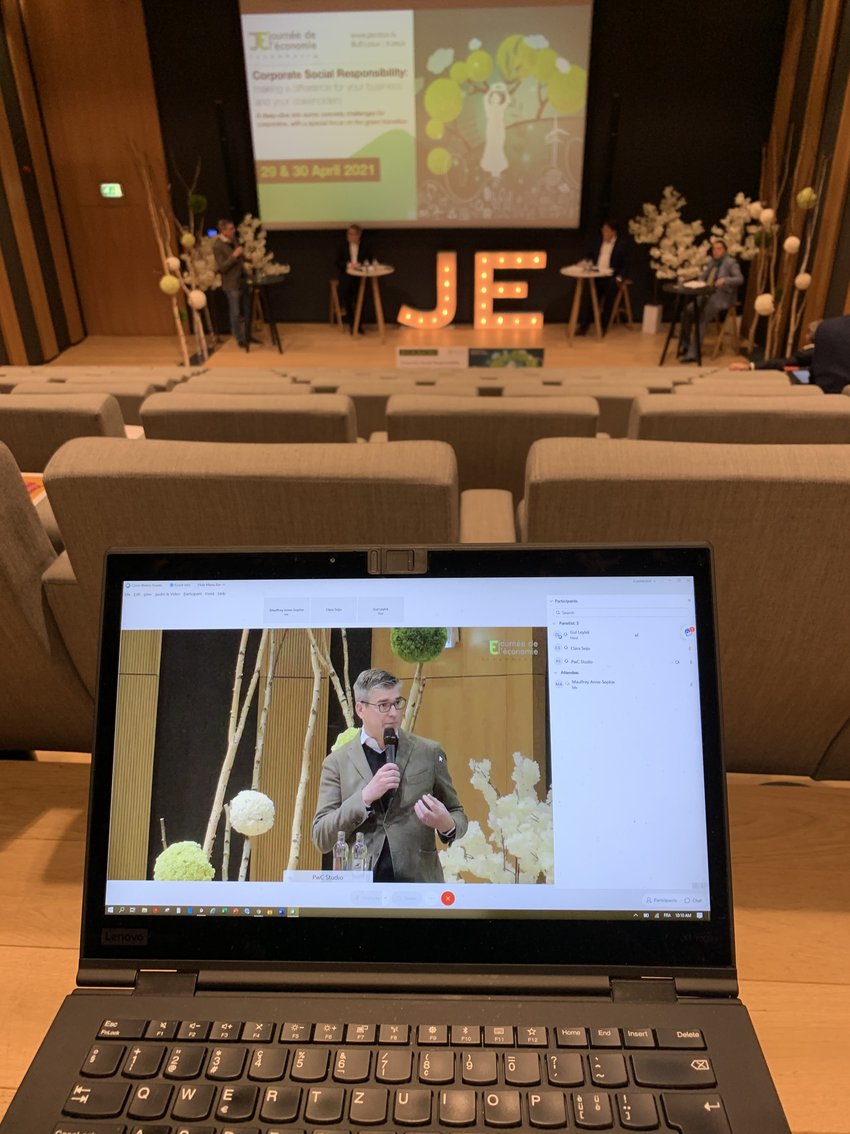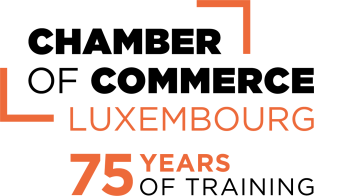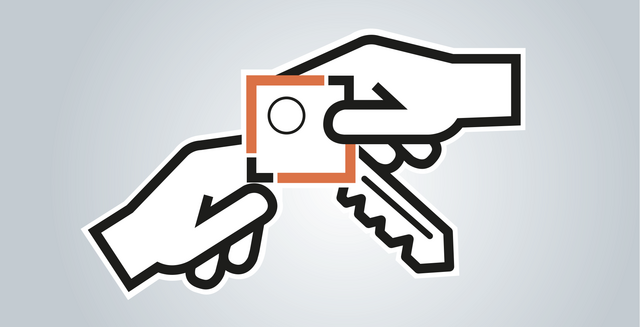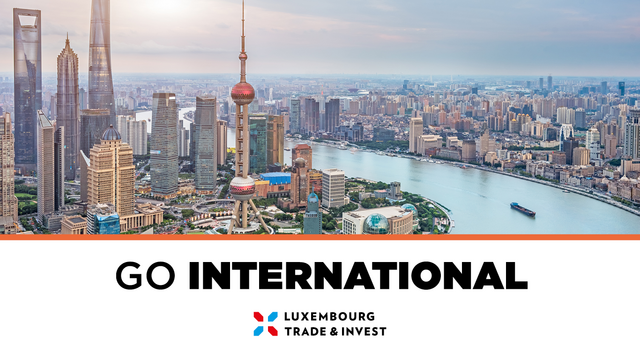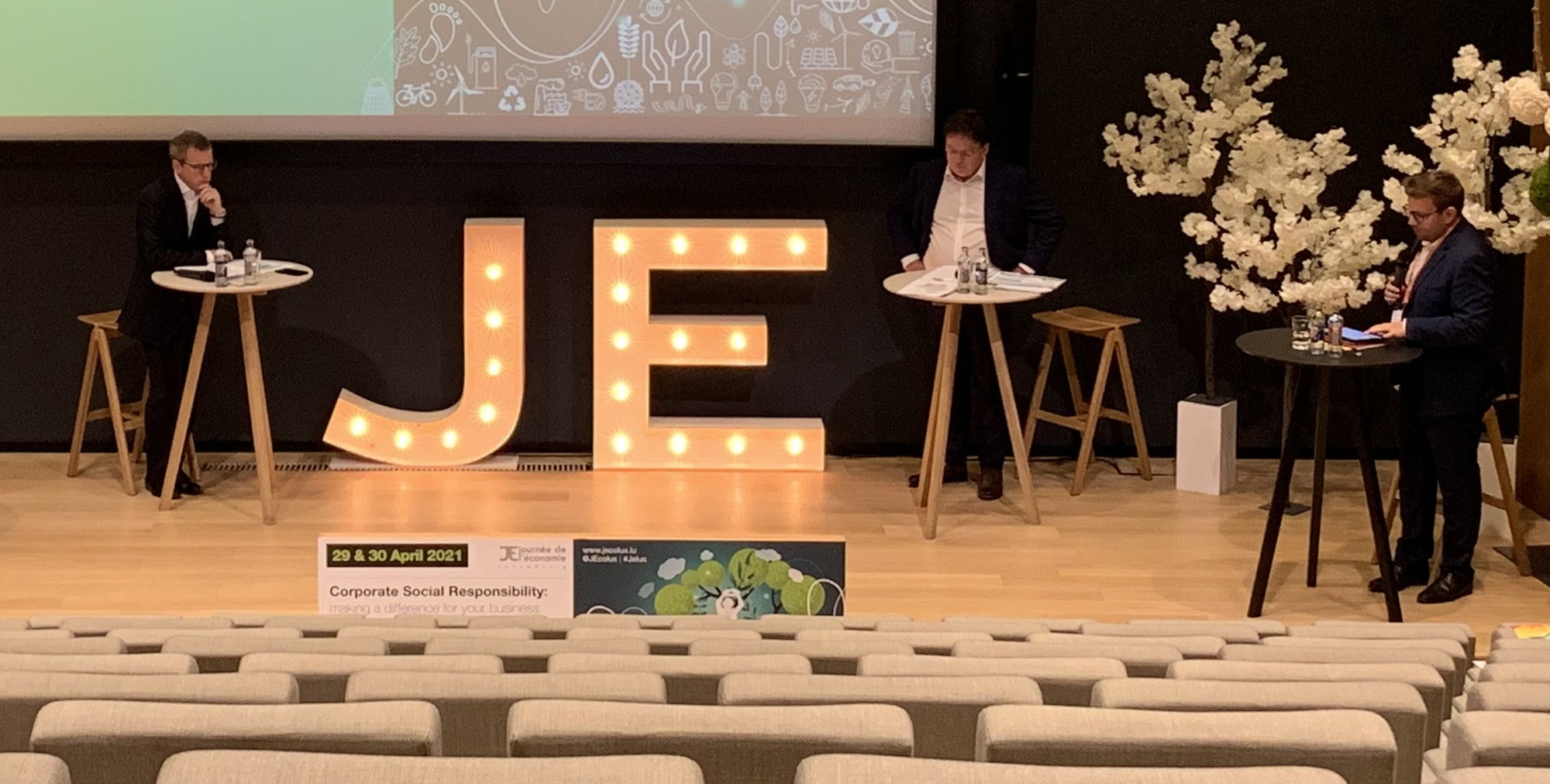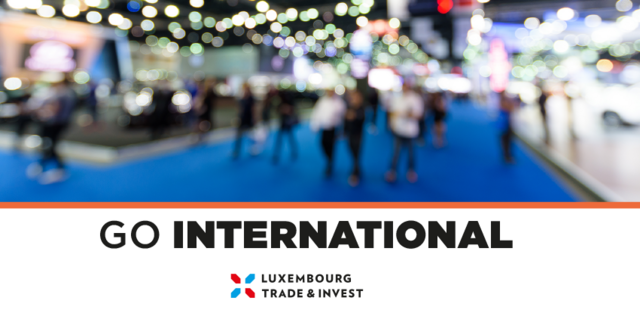
Journée de l'Economie 2021
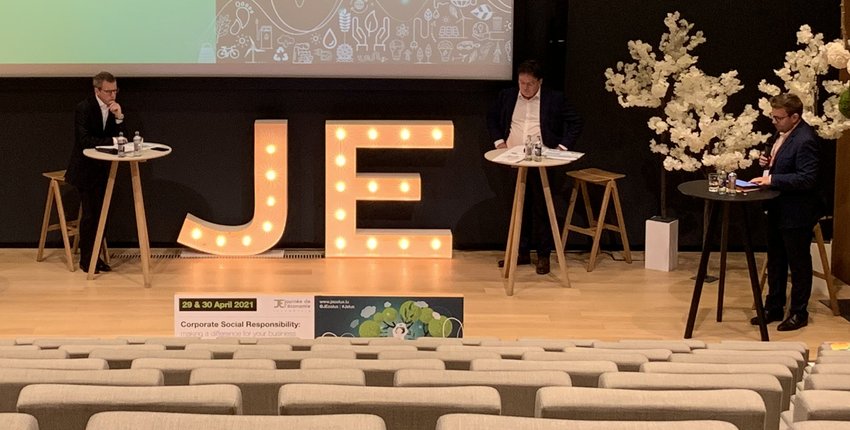
At the close of the 15th Journée de l’Economie one thing was made perfectly clear - now is the time for action
Journée de l’Economie 2021 has ended for another year and the over 200 persons registered for the two-day event gave evidence that CSR is ranking increasingly higher in Luxembourg’s agenda. But it isn’t just good intentions that will drive change ?it will take strategy and implementation. The discussions and workshops at “CSR Making a difference for your business and your stakeholders” looked at the very real and practical challenges for corporations when moving towards the green economy from a multitude of angles.
Organised by the Ministry of the Economy, the Luxembourg Chamber of Commerce and FEDIL –The Voice of Luxembourg’s Industry, in cooperation with PwC Luxembourg, this year’s Journée de l’Economie (JEcolux 2021) aimed at analysing in depth certain key aspects from the green transition for the real economy. The discussions look at the CSR issues from all angles ?consumerism, manufacturing, reduction of carbon emissions, sustainable reporting, and more? and what is clear is that the time is now for action but the road ahead will not be an easy one.
JEcolux 2021 was challenged in 2020 as were many events by COVID-19 but the event ran smoothly and virtually this year with most of the speakers in Luxembourg greeting virtual guests directly from PwC’s Crystal Park Auditorium.
This year, the annual conference assembled leading names from the worlds of business, academia and politics to discuss and debate some critical issues linked more specifically with the environmental transition embedded in the push towards a more sustainable future. Experts both from Luxembourg and international guests examined three key aspects in depth, all related to the green transition: taxonomy (reporting), environmental tax and the energy issue.
Day one focussed more on keynote speakers while on Day two, participants “rolled up their sleeves” in workshops, discussion groups or by giving presentations, all taking a deep-dive into such strategic considerations as, “From shareholder capitalism to stakeholder capitalism: a path to strategic business transformation”, “Green Economy - Strategic options in tax policy” and “Towards a sustainable Industry - what does that mean?”
François Mousel, Clients and Markets Leader from PwC Luxembourg, helped set the tone for the two days saying, “It’s time to put words into action. We are at a crossroads for deciding how we will succeed in a greener future, and these two days are dedicated to bringing more food for thought to the debate alongside some critical issues linked, more specifically, with the environmental transition embedded in the push towards a more sustainable future.”
As the pressure to become more sustainable continues to rise among societies and economies, businesses are moving to the front lines of this initiative, working together with governments and leading by example. As Carlo Thelen, Director General, Luxembourg Chamber of Commerce said, “Corporate Social Responsibility is going mainstream, but it’s a demanding task for business that requires a strong commitment from governments to make it happen. Now it’s time to put words into action to create a sustainable, economically resilient society.”
Journée de l'Economie 2021 - Welcome words by Carlo Thelen from Luxembourg Chamber of Commerce on Vimeo.
However, business and industries can’t merely focus on introducing sustainability into their business core. To take decisive steps into a greener future, they’ll need to also set their sights on a greener economy.
Serge Allegrezza, Director General of Statec, the Luxembourg Institute for Statistics and Economic Studies, said, “One can see that different stakeholders are converging around the idea of a greener future, notably politicians, lawmakers and corporates. The E of ESG has overcome the S and the G. However, in Luxembourg, businesses haven’t focused enough on the green economy, although they are investing in the change motivated by different reasons being clients' demands among them. In this 2021 edition, we talk about taxonomy, taxation and the energy supply transition needed for the green economy.”
Luxembourg, with its unique strengths and it’s leading position worldwide when it comes to sustainability and sustainable finance, continues to push its boundaries and is set to take the first steps towards a greener economy.
Franz Fayot, Luxembourg’s Minister of the Economy, emphasised that, “Luxembourg is committed to the European Union's goal to achieve climate neutrality by 2050.” He also said that, “We need to take advantage of future opportunities such as industry 4.0, cleantech, space, to name a few…” and he expanded on digitalisation, saying, “The government’s plan for a digital-enabled green transition involves accelerating the digitalised economy to tackle sustainability and societal challenges.”
Going through an economic transformation isn’t easy, nor is it something that can be achieved in the short-term. It’s a long process, and it can no longer be pushed into the back of the mind. The clock is ticking for the planet and time is running out. This is an urgency strongly felt by Valérie Arnold, Corporate Responsibility and Sustainability leader at PwC Luxembourg who is an evangelist for sustainability and the fight for a greener future and who posed the question in her workshop whether industries are willing to decouple growth from CO2 emissions through innovation.
Ann Pettifor, Director, Policy Research in Macroeconomics (PRIME) talked about the green transition and the urgent need for economic transformation. “The world has finite resources. We need a steady economy that minimises waste and reuses and recycles materials,” she explained. On how to start the green transition she said, “We need to change our mindset about exponential growth and consumption and start focusing on our needs, not our wants. That’s what the *Green New Deal (*in the US) is all about.”
Institutions worldwide, including the European Union, have been working tirelessly on the theme of sustainability, tackling one of its main challenges: finding a common classification instrument to help European economies and businesses determine which activities are classified as sustainable. EU Taxonomy is an essential piece of the greater puzzle called the Action Plan on Sustainable Growth, issued by the European Commision March 2018.
Mireille Martini, Policy Analyst, OECD Environment Directorate on EU Taxonomy, walked the participants through the EU taxonomy and the challenge of defining sustainability, the current framework linking objectives together, which for now are only climate objectives. She said, "The green transition cannot be done without international cooperation and we need to work together globally to define what is sustainable or not. The European Union has already started to produce its definition.”
However, taxonomy isn’t, by far, the only challenge for businesses. Implementing ESG into the business core and into the investment decision-making is a complex process, and it's not without its pitfalls.
John Parkhouse, CEO of PwC Luxembourg shared his experience about the challenges of implementing ESG for a large company, “The challenge now is how to integrate the core areas and how to operationalise them. As a leader, when I look back, I realise how much I underestimated how difficult it is to do that... it’s a long journey and there is a lot of work to be done."
Dr Gaston Trauffler, Head of industrial policy activities in FEDIL, encapsulated how difficult this journey ahead may be, but also how important it is, by saying, “I don’t think we can simply distinguish between winners and losers, it’s not that simple. It would be easier if we would already have alternative, low-carbon substitution-technologies in all sectors, but that’s not the reality. The businesses that embrace the green transition by actively seeking for those new low-carbon solutions will emerge as the leaders of this change."
The Journée de l’Economie is now officially over for another year. The organisers look forward to seeing everyone next year hopefully on-site. They also extend a big thank you to everyone who participated including Dr Stefan Speck, Economic Assessments and Sustainable Expert, European Environment Agency (EEA) and Michael Grubb, Professor of Energy and Climate Change & Research Director, UCL Institute for Sustainable Resources as well as the number of panelists who contributed to the event on Day 2 and therefore added to the way forward to a more sustainable future.
To find out more about the event or to share your point of view, visit our website: www.jecolux.lu and follow us on Twitter @JEcolux #Jelux.
The conference was held in English and French.
